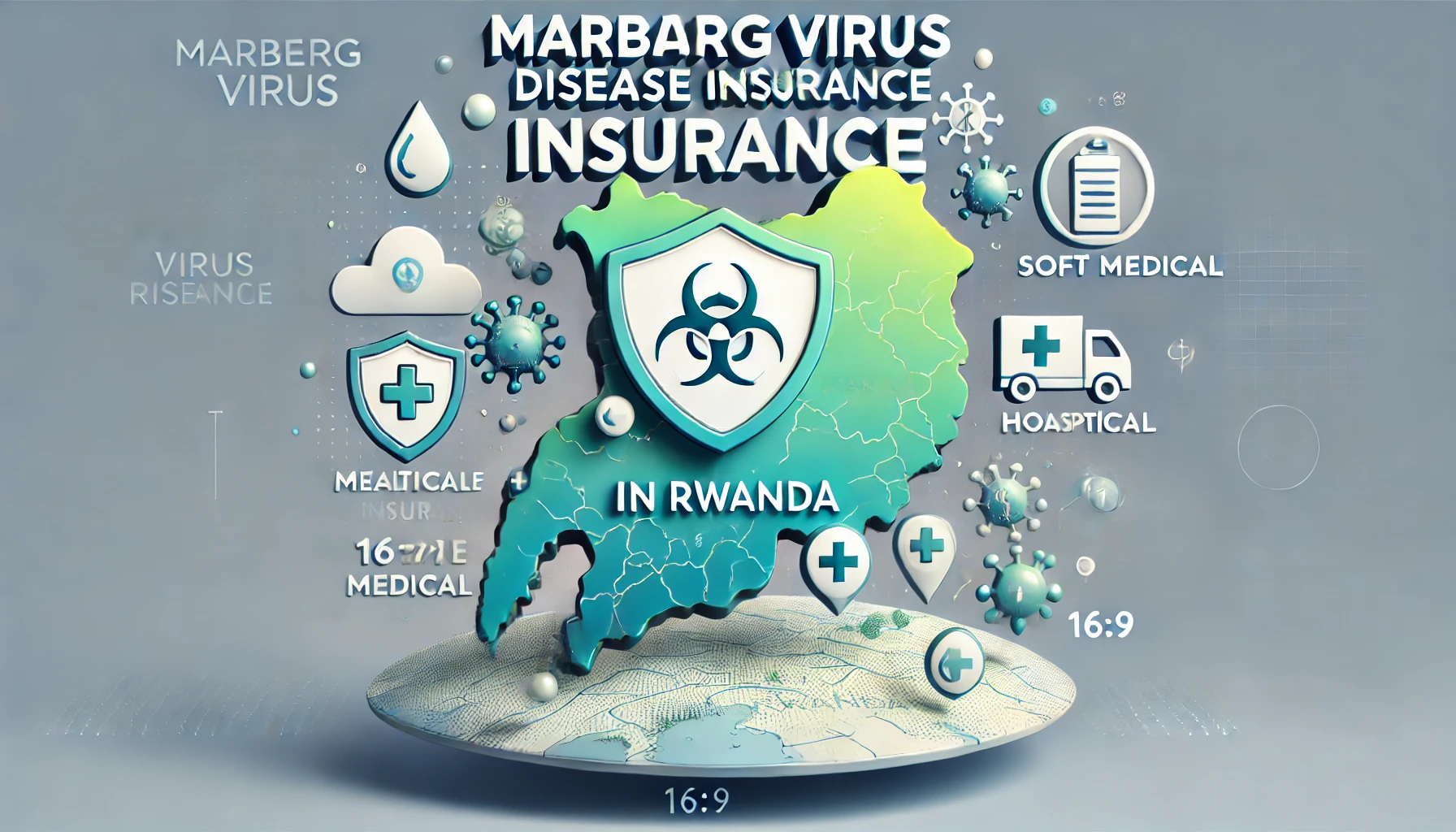If you’re from Rwanda or just curious about public health, you may have heard of Marburg virus disease (MVD). Marburg virus disease is a rare but serious illness that can cause high fever, severe bleeding, and even death. While it is similar to the well-known Ebola virus, Marburg disease has its own unique challenges and risks. Due to its dangerous nature, many people in Rwanda and around the world are becoming more interested in Marburg virus disease insurance in Rwanda. Insurance can help cover the costs of treatment and support for those affected by the virus. Let’s dive into what Marburg virus disease insurance is, how it works in Rwanda, and what you need to know about its costs.
What Is Marburg Virus Disease?
The Marburg virus was first discovered in 1967, and outbreaks are still rare. However, when the disease does appear, it can spread quickly and cause a lot of damage. The virus spreads to humans through contact with infected animals, especially bats, and then spreads from person to person through bodily fluids. Learn more about Marburg virus from the World Health Organization (WHO).
Some of the symptoms include:
- High fever
- Headaches
- Severe muscle pain
- Vomiting
- Bleeding from different parts of the body
These symptoms can start quickly and become severe in a short period. Because Marburg is so dangerous, it is essential to seek treatment immediately if exposed to it.
Why Do You Need Marburg Virus Disease Insurance in Rwanda?
In Rwanda, the healthcare system is constantly improving, but diseases like Marburg can put a heavy burden on families. Treatment for Marburg virus disease can be very costly because patients often need intensive care, including fluids, medications, and sometimes isolation to prevent the disease from spreading. Marburg virus disease insurance helps cover these costs, allowing people to focus on getting better rather than worrying about medical bills.
How Does Marburg Virus Disease Insurance Work?
Marburg virus disease insurance is a type of health insurance designed to help people pay for the costs associated with Marburg virus treatment. Insurance companies offer policies that cover hospitalization, medical care, and sometimes even family support if a loved one falls ill with Marburg virus disease. Check out more about infectious disease insurance here.
In Rwanda, insurance companies may offer Marburg virus disease insurance separately, or it might be included as part of a general health insurance policy that covers multiple diseases. The insurance can be used to pay for hospital stays, doctor visits, medical tests, and other treatments.
What Are the Key Benefits of Marburg Virus Disease Insurance?
Marburg virus disease insurance can be very helpful, especially during an outbreak. Here are some of the main benefits:
- Financial Support: The insurance covers medical expenses, reducing the financial burden on families.
- Quick Access to Care: Many insurance policies have agreements with hospitals, meaning patients get quick and efficient care.
- Travel Protection: Some policies cover travel costs if a person needs to be taken to another city or even another country for treatment.
- Family Assistance: Certain policies offer support for family members if they have to take time off work or need counseling.
Costs and Offers for Marburg Virus Disease Insurance in Rwanda
The cost of Marburg virus disease insurance in Rwanda can vary based on the insurance company, the coverage amount, and the benefits offered. Here is a breakdown of the estimated costs and some offers available in Rwanda.
- Basic Marburg Virus Coverage
Cost: Around RWF 15,000 to RWF 30,000 per year
Coverage: Basic coverage often includes hospital stays, doctor consultations, and standard medical treatments related to Marburg virus disease.
Read more about affordable health insurance options here. - Comprehensive Marburg Virus Insurance
Cost: Around RWF 50,000 to RWF 80,000 per year
Coverage: This level of insurance typically covers more extensive medical care, including intensive care unit (ICU) stays, specialized treatments, travel costs for treatment, and support services for family members.
Explore options for comprehensive health coverage here. - Family Marburg Virus Insurance Package
Cost: Around RWF 100,000 to RWF 150,000 per year for a family
Coverage: This type of insurance covers all family members and often includes preventive care, emergency medical evacuations, and mental health support for family members. It also usually offers counseling services for family members.
Learn about family health insurance plans here.
Where Can You Buy Marburg Virus Disease Insurance in Rwanda?
Several insurance providers in Rwanda offer Marburg virus disease insurance. You may choose to buy insurance from government-supported programs or private companies, depending on what suits your needs.
- RSSB (Rwanda Social Security Board): Rwanda’s national health insurer may offer coverage options that include infectious diseases like Marburg.
- Prime Life Insurance: This private insurance company provides different health coverage options, including Marburg disease coverage.
- Saham Assurance Rwanda: Another private insurance company with plans that cover infectious diseases.
- Radiant Insurance: Offers various health insurance plans that may include coverage for rare diseases like Marburg.
Check out more insurance providers in Rwanda.
How to Choose the Right Marburg Virus Disease Insurance Plan
Choosing the right insurance plan depends on a few important factors:
- Your Budget: Make sure you can afford the yearly or monthly premium. If you’re looking for basic protection, a lower-cost plan might work well, but for more extensive coverage, you may want to consider a higher-tier plan.
- Coverage: Check the plan to see what it covers. If you need coverage for your whole family or additional support like travel expenses, make sure the plan includes those options.
- Hospital Network: Some insurance plans only work with specific hospitals. Make sure the insurance provider has agreements with hospitals near you or where you prefer to receive care.
- Add-Ons: Some companies offer extra benefits, like counseling for family members or preventive check-ups. These add-ons can be very helpful, especially in the case of a serious disease like Marburg.
- Waiting Period: Some insurance plans may have a waiting period before they start covering expenses related to Marburg virus disease. Always check the fine print so you know when your coverage begins.
For more information on choosing the best health insurance plan, you can read this guide.
Protecting Yourself and Your Family from Marburg Virus
Aside from buying insurance, there are other ways to protect yourself from the Marburg virus. Because the virus is spread through contact with infected animals and bodily fluids, here are some ways to reduce your risk:
- Avoid areas known to have outbreaks of Marburg virus.
- Limit contact with fruit bats or primates that may carry the virus.
- Always wash your hands and use protective gear when around someone who may be infected.
- Follow government and health authorities’ instructions during an outbreak.
By combining Marburg virus disease insurance with these preventive measures, you can help protect yourself and your loved ones from the financial and health impacts of the disease.
What Does Marburg Virus Disease Insurance Cover?
The coverage provided by Marburg virus disease insurance varies depending on the insurance plan and the provider. Generally, these insurance plans cover most of the main costs associated with treating the disease. Here’s a closer look at what typical Marburg virus disease insurance in Rwanda may cover:
- Hospitalization: When infected with Marburg virus, patients usually need to stay in the hospital under careful supervision. Hospitalization costs can add up quickly, especially if a patient requires intensive care or isolation.
- ICU Care: Severe cases may require admission to an Intensive Care Unit (ICU), where patients receive specialized attention and round-the-clock care. ICU stays can be very costly, and Marburg insurance often helps cover these expenses.
- Diagnostic Tests: The diagnosis of Marburg virus disease requires specialized tests, which may be costly. Insurance coverage generally includes costs for laboratory tests, imaging, and other diagnostic procedures needed to confirm the virus.
- Medications: Treating Marburg virus disease can require various medications to manage symptoms, reduce fever, and prevent secondary infections. Insurance plans often cover medications prescribed by doctors, especially if the drugs are essential for treatment.
- Personal Protective Equipment (PPE): Since Marburg virus is highly contagious, healthcare workers and family members who come in contact with the patient need personal protective equipment like gloves, masks, and gowns. Some insurance policies cover PPE costs, particularly for the patient’s close contacts.
- Emergency Transportation: Patients may need emergency transportation if they require specialized care in another location. Insurance plans often include coverage for emergency ambulance services or even airlifting if necessary.
- Mental Health Support: Serious illnesses like Marburg can be very stressful for both the patient and their family. Some insurance policies offer mental health support, such as counseling sessions or therapy for the patient and their close family members.
For more information on health insurance coverage details, check out this guide to insurance benefits.
Additional Benefits of Marburg Virus Disease Insurance

Insurance policies for Marburg virus disease may also offer additional benefits that provide broader protection and support. These are extras that go beyond standard coverage and aim to provide peace of mind to policyholders.
1. Family Support Services
Some policies include support for family members who may need to take time off work or face emotional difficulties. Family support services may include financial aid, counseling, and even temporary income replacement.
2. Preventive Care
Though Marburg virus cannot be entirely prevented, insurance companies may offer preventive health check-ups to monitor your overall health and identify any early signs of infection or other diseases. Regular health check-ups can be especially useful for individuals working in high-risk professions or near outbreak areas.
3. Death Benefits
In extreme cases, if a policyholder succumbs to Marburg virus disease, certain insurance plans may provide a death benefit to the family. This financial support can help the family manage funeral costs or other expenses in the absence of their loved one.
4. Outbreak-Specific Coverage
During an active outbreak, some insurance providers may enhance coverage benefits, waiving certain costs or offering special support services to policyholders in affected areas. Outbreak-specific coverage is designed to make sure that policyholders have the financial and medical resources they need in a timely manner during an emergency.
5. Income Protection
Marburg virus disease can require extended periods of isolation, which may impact a patient’s ability to work. Some insurance plans provide income protection, covering a portion of lost wages if the policyholder is unable to work during treatment and recovery. This benefit is especially valuable for people who are self-employed or work in jobs that don’t offer paid sick leave.
How Much Does Marburg Virus Disease Insurance Cost?
While the price of Marburg virus disease insurance depends on several factors, including the type of coverage and the insurance provider, here is a general overview of what people in Rwanda might expect to pay:
- Individual Basic Coverage: Around RWF 15,000 – RWF 30,000 per year. Basic plans are ideal for individuals looking for essential protection against hospitalization and medication costs.
- Individual Comprehensive Coverage: Around RWF 50,000 – RWF 80,000 per year. This type of plan offers more extensive support, including ICU care and emergency transportation.
- Family Basic Plan: Around RWF 80,000 – RWF 120,000 per year for a family of up to five. A family basic plan covers hospitalization and treatment costs for multiple family members.
- Family Comprehensive Plan: RWF 120,000 – RWF 200,000 per year for a family. This plan provides enhanced coverage, including travel costs, mental health support, and family income protection.
To explore more specific cost estimates or to find a plan that fits your budget, compare options from multiple health insurance providers.
What to Look for in a Marburg Virus Disease Insurance Policy
Before purchasing Marburg virus disease insurance, it’s essential to evaluate the policy carefully. Here are some key things to consider:
Premiums vs. Coverage
Make sure you’re not overpaying for coverage. For instance, if you don’t need extensive travel protection, you might save money by choosing a basic plan with lower premiums. However, if you want full coverage, a comprehensive plan might be worth the higher cost. Learn about budgeting for health insurance premiums here.
Exclusions and Limitations
Insurance policies often have exclusions, or items they don’t cover. These can include specific treatments or certain types of healthcare providers. Be sure to understand the policy’s limitations to avoid unexpected costs.
Policy Duration and Renewability
Some insurance policies are valid for a set period, like one year, after which you may need to renew. Check whether your policy is renewable and whether the price might increase upon renewal. Also, find out if the policy has any waiting periods, which can delay coverage at the start.
Claim Process and Ease of Access
Knowing the process for filing a claim and how quickly claims are processed can save you time and stress. Ask your insurance provider about the claim filing procedure and if there’s a dedicated support team to help with Marburg virus-related claims.
Reputation of the Insurance Company
It’s always a good idea to look into the insurance company’s history and customer reviews. Look for a provider known for quick response times, easy claim processes, and good customer service.
Conclusion
Marburg virus disease insurance is an important safety net for people living in Rwanda. As Marburg virus is highly infectious and can lead to costly treatments, having insurance can reduce stress and financial burden during difficult times. Whether you need basic coverage or a family plan, there are insurance options available that can support you if the unexpected happens.
Remember, it’s always better to be prepared and protected against rare but severe diseases like Marburg. By considering your needs and budget, you can choose the right insurance plan that keeps you and your family safe. For more detailed information on Marburg virus disease and insurance options, visit the WHO’s official page on Marburg virus or contact your local insurance provider.
Stay safe and healthy, and always remember the importance of insurance for yourself and your loved ones!

